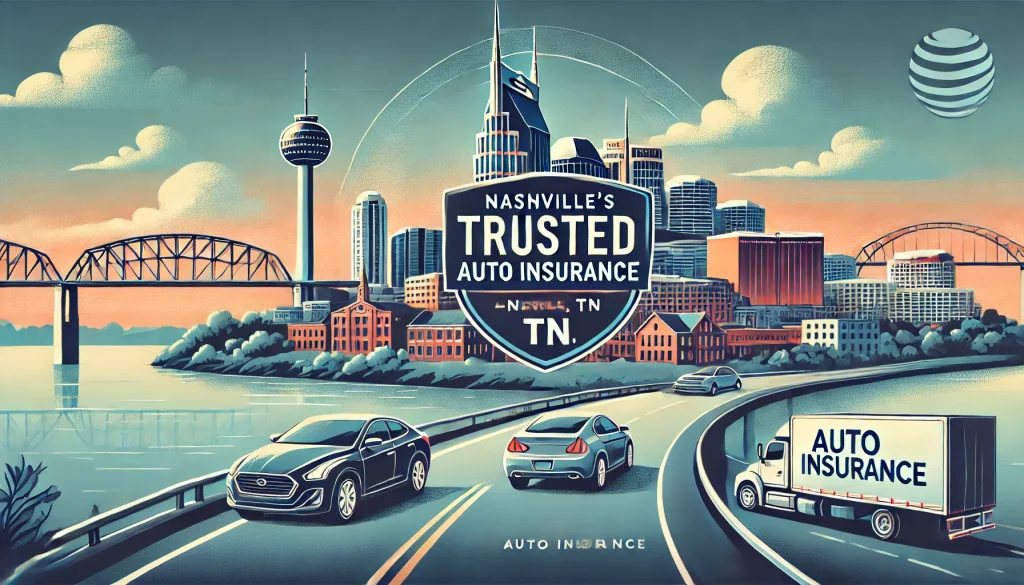Auto Insurance Nashville TN
If you’re in search of reliable and affordable auto insurance in Nashville, TN, you’ve come to the right place. In a bustling city like Nashville, where the traffic is dense, the roads are unpredictable, and the weather can change at any moment, having the right car insurance is more important than ever. Whether you’re a first-time car owner or looking to switch providers, this guide will help you navigate the options available, understand the factors that influence your rates, and find the best coverage that suits your needs.
Why You Need Auto Insurance in Nashville, TN
Nashville, with its growing population and busy streets, presents unique challenges when it comes to driving. The city’s roadways are often congested, which increases the chances of accidents. In addition to the traffic, Nashville also experiences unpredictable weather, such as heavy rain, hail, and even occasional snow. Having adequate auto insurance in Nashville is crucial for protecting yourself, your passengers, and your vehicle in the event of an accident, damage, or theft.
In Tennessee, state law requires drivers to carry minimum liability insurance, but it’s highly recommended to go beyond the bare minimum to ensure you are fully covered. With proper coverage, you’ll be able to pay for damages, medical expenses, and other costs resulting from an accident, rather than shouldering those costs yourself.
What to Look for in Auto Insurance Quotes in Nashville, TN
When you start searching for auto insurance quotes in Nashville, TN, there are several key factors you need to consider in order to choose the right coverage. Here are some important aspects to keep in mind while comparing quotes:
1. Coverage Types
One of the first things to understand is the type of coverage you need. The basic requirements for car insurance in Tennessee include liability coverage, which helps cover the costs associated with injury or damage you cause to others in an accident. However, depending on your situation, you might want additional coverage, such as:
- Collision Coverage: This helps pay for repairs to your car if you’re involved in an accident, regardless of who is at fault.
- Comprehensive Coverage: This covers non-collision-related damage to your vehicle, such as theft, vandalism, or weather damage.
- Uninsured/Underinsured Motorist Coverage: This protects you in the event that you’re involved in an accident with a driver who doesn’t have sufficient insurance.
Be sure to evaluate your coverage needs based on your driving habits, the value of your vehicle, and your budget. Comprehensive and collision coverage, while optional, can provide extra peace of mind and financial protection.
2. Discounts
Many auto insurance providers offer discounts that can lower your premium. Some common discounts include:
- Safe Driver Discounts: If you have a clean driving record, insurers may reward you with a discount.
- Multi-Policy Discounts: Bundling your car insurance with other policies, such as homeowners or renters insurance, can lead to savings.
- Low-Mileage Discounts: If you don’t drive much, some insurers offer discounts for low annual mileage.
- Anti-Theft Discounts: Installing a security system or anti-theft devices in your vehicle can help reduce premiums.
3. Claims Process
The process of filing a claim and the speed with which your insurance company handles it is a crucial consideration. Look for an insurer known for its responsive customer service and easy-to-navigate claims process. Customer reviews and ratings can provide insight into the quality of service you can expect from a particular provider.
How Your Driving Record Affects Your Auto Insurance Rate in Nashville
Your driving record is one of the most important factors that determines your auto insurance rate in Nashville. If you have a history of traffic violations, accidents, or claims, your premium may be higher compared to someone with a clean driving record. Here’s why:
1. Traffic Violations
Speeding tickets, DUIs, and other traffic violations are often considered signs of risky driving behavior. Insurance companies take these violations into account when calculating your premium because you’re statistically more likely to file a claim. Even a single speeding ticket can increase your rate, though the impact may be less severe over time if you remain ticket-free afterward.
2. At-Fault Accidents
If you’ve been involved in an at-fault accident, your insurer may increase your premium to reflect the higher risk of future claims. In some cases, your rates may go up even if the accident wasn’t your fault but you were found to be negligent (e.g., distracted driving). To mitigate the impact, maintaining a clean driving record going forward is important.
3. Traffic Accidents and Claims
Filing multiple claims within a short period can signal that you’re a high-risk driver, leading to higher premiums. Some insurance providers offer accident forgiveness for first-time offenders, which can help prevent a spike in your rates after a minor accident.
Factors That Impact Auto Insurance Costs in Nashville, TN
When shopping for auto insurance in Nashville, TN, you’ll notice that premiums vary widely from one provider to another. In addition to your driving record, there are several other factors that insurers consider when setting rates. These include:
1. Vehicle Type
The make, model, and age of your car can influence your insurance rates. Newer cars, especially luxury vehicles or models that are expensive to repair, may come with higher premiums. Similarly, sports cars or vehicles with high performance may also be more expensive to insure due to the higher likelihood of accidents or theft. On the other hand, older cars with fewer features may come with lower premiums, but they may also lack important safety technologies that could help reduce risk.
2. Location
Nashville’s urban environment means that auto insurance premiums may be higher than in rural areas, simply due to the increased likelihood of accidents, theft, or vandalism. Additionally, traffic congestion and weather conditions in the area can also impact insurance rates. If you live in a neighborhood with a high crime rate or frequent accidents, your rates may be higher compared to someone living in a safer, less congested area.
3. Age and Experience
Younger drivers, especially teenagers, typically face higher premiums because they’re considered higher risk due to their lack of experience. On the other hand, older drivers with more experience on the road generally receive lower rates. Some insurers offer discounts for drivers over a certain age, especially those who have completed defensive driving courses or have a long history of safe driving.
How to Compare Auto Insurance Quotes in Nashville, TN
Once you’ve gathered multiple auto insurance quotes, it’s essential to compare them carefully to find the best deal. Here are some steps to help you evaluate your options:
1. Compare Coverage Levels
Don’t just look at the price when comparing quotes. Examine the coverage levels and ensure they meet your needs. Pay close attention to the types of coverage included, such as liability, collision, and comprehensive coverage. Additionally, compare deductibles, as a higher deductible will lower your premium but increase your out-of-pocket costs in the event of a claim.
2. Look for Customer Reviews
Customer satisfaction is another key factor when choosing an insurer. Look for online reviews and ratings to get a sense of how well the company handles claims and customer service. You can also check ratings from organizations like J.D. Power and the Better Business Bureau for more insight into the provider’s reputation.
3. Evaluate Discounts
Make sure to ask each provider about any available discounts. Some companies offer special deals for bundling auto and home insurance, while others may have discounts for safe drivers or vehicles with anti-theft systems. Ensure that you’re taking full advantage of any discounts you qualify for to reduce your premium.
Frequently Asked Questions (FAQ)
1. What is the minimum required auto insurance in Nashville, TN?
Tennessee law requires all drivers to have at least liability insurance, which covers bodily injury and property damage to others if you’re at fault in an accident. The minimum limits are $25,000 for bodily injury per person, $50,000 for bodily injury per accident, and $15,000 for property damage.
2. How can I lower my auto insurance premiums in Nashville?
You can lower your premiums by maintaining a clean driving record, increasing your deductible, bundling your auto insurance with other policies, and taking advantage of discounts like safe driver or low-mileage discounts.
3. Does auto insurance cover weather damage in Nashville?
Yes, if you have comprehensive coverage, weather-related damage such as hail, floods, or falling trees may be covered. Be sure to check with your provider to confirm what’s included in your policy.
4. How often should I review my auto insurance in Nashville?
It’s a good idea to review your auto insurance policy annually, especially if you’ve made changes such as getting a new car, moving to a different area, or experiencing changes in your driving habits.
5. Can I get auto insurance without a credit check in Nashville?
While most insurance companies in Nashville will check your credit score, some may offer policies without a credit check. However, your credit score may still influence your premium with certain providers.
For more detailed advice or to get a free quote, visit our trusted insurance partners:






